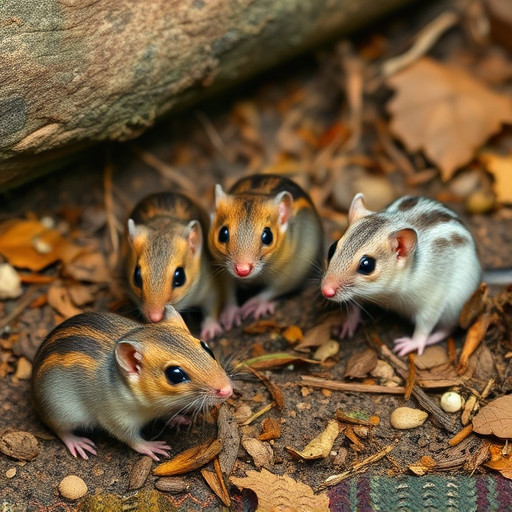Rodent control Tucson is a critical issue due to the city's unique arid climate fostering a diverse rodent population, including pack rats, roof rats, and house mice. These creatures can cause extensive property damage, contamination, and pose health risks with their potential to carry diseases and parasites. Effective management of this problem requires tailored strategies that incorporate integrated pest management (IPM) practices such as exclusion, sanitation, monitoring, and selective use of traps and baits. Proactive measures like regular inspections, sealing entry points, and maintaining clean conditions are essential for prevention. Tucson residents and businesses should adopt a preventative approach to rodent control, as early intervention is more effective and cost-efficient than addressing issues post-infestation. Professional pest control services in Tucson offer customized solutions based on local rodent dynamics, ensuring the protection of properties and public health through targeted strategies. Maintaining vigilance with these methods underlines the commitment to effective rodent control Tucson, safeguarding both residential and commercial environments from the challenges posed by these pests in this Arizona city.
Residents and business owners in Tucson face a persistent challenge with rodent infestations, a situation that requires both proactive measures and professional intervention. This article delves into the most effective rodent control strategies tailored for Tucson’s unique environment, addressing the prevalence of local infestations and the damage they can cause. From understanding the common rodent species to implementing long-term sustainable management practices, we explore a comprehensive approach to keep homes and businesses safe and rodent-free. Key aspects such as preventative measures, sanitation, exclusion techniques, monitoring and trapping, and the role of professional pest management services are discussed, ensuring Tucson’s community is well-equipped to tackle this persistent issue.
- Understanding the Rodent Challenge in Tucson: An Overview of Local Infestations and Damage
- Effective Rodent Control Strategies for Tucson Residents and Businesses
Understanding the Rodent Challenge in Tucson: An Overview of Local Infestations and Damage

In Tucson, Arizona, the arid climate and abundant vegetation provide ideal habitats for a variety of rodent species. Homeowners and businesses in Tucson face unique challenges when it comes to rodent control due to the region’s distinct environmental conditions. These local infestations can cause significant damage to properties, contaminate food supplies, and pose health risks through the transmission of diseases. Understanding the types of rodents prevalent in Tucson, such as pack rats (woodrats) and roof rats, is crucial for implementing effective control strategies. These creatures not only compromise structural integrity by gnawing on wiring, insulation, and building materials but also create nests that can harbor parasites and pathogens.
Effective rodent control Tucson measures must be tailored to the local context, taking into account the specific behaviors and habits of these pests. Integrated pest management (IPM) practices are recommended, combining exclusion methods, sanitation, monitoring, and judicious use of traps and baits where necessary. Regular inspections, sealing entry points, and maintaining clean environments can significantly reduce the risk of infestation. Businesses and residents should be proactive in their approach to rodent control Tucson, as prevention is often more effective and less costly than remediation after an infestation has taken hold. By understanding the local rodent challenge and implementing targeted strategies, Tucson residents and businesses can safeguard their properties and well-being.
Effective Rodent Control Strategies for Tucson Residents and Businesses

In the arid city of Tucson, Arizona, maintaining effective rodent control is essential for both residential and commercial properties. Tucson’s unique environment presents specific challenges for pest management, particularly with the prevalence of rodents such as pack rats, roof rats, and house mice. Local businesses and residents can implement a variety of strategies to mitigate these issues. Firstly, proper sanitation practices are vital in preventing rodent infestations. Regular cleaning, sealing food packages, and removing water sources can significantly reduce the appeal of properties to these pests. Additionally, Tucson’s residents and businesses should address structural weaknesses by sealing entry points and maintaining good drainage to prevent access. Employing traps and bait stations appropriate for the desert environment are also effective measures. It’s important to use rodenticides that align with local regulations and are safe for pets and wildlife. Professional pest control services in Tucson offer tailored solutions, including monitoring, exclusion, and extermination, ensuring a comprehensive approach to rodent control. These experts understand the local species behavior patterns and can provide the most effective treatment plans. By staying vigilant and proactive with these strategies, Tucson residents and businesses can effectively manage and control rodent populations, safeguarding public health and property integrity.
In conclusion, maintaining a rodent-free environment in Tucson is a multifaceted task that requires diligence and proactive measures. By understanding the local challenges associated with these pests, Tucson residents and businesses can implement effective rodent control strategies tailored to their specific needs. The integration of preventive practices, such as sealing entry points, removing food sources, and maintaining clean environments, coupled with professional rodent control services when necessary, will greatly reduce the risk of infestations and the damage they can cause. It’s imperative for the community to work together to ensure a safe and healthy living and working space, thus preserving Tucson’s quality of life. Rodent control in Tucson is an ongoing commitment that pays dividends in safety and property preservation.
